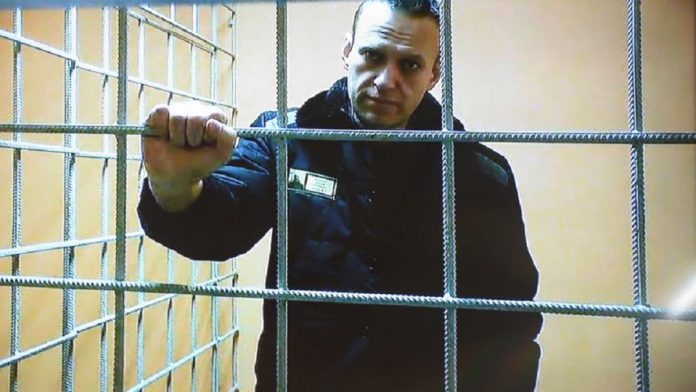It comes after Russia passed new laws that mean people who spread “fake” information could be jailed for up to 15 years.
Jailed Kremlin critic Alexei Navalny has been found guilty of large-scale fraud and contempt of court by a Russian court, it said on Tuesday.
Russian prosecutors are seeking to move Navalny to a maximum security penal colony for 13 years on charges of fraud and contempt of court.
Mr Navalny, 45, was arrested in January 2021 after returning to Russia from Germany where he had been recovering from nerve agent poisoning – something he blames on the Kremlin and which Russian authorities deny.
He is an outspoken critic of President Putin and is serving a three-and-a-half year sentence on charges he stole £3.5m of donations to his political organisations, which he denies.
He went on trial again accused of fresh fraud charges last month inside the maximum-security prison east of Moscow where he is detained.
In the hearing, Navalny stood next to his lawyers in a room filled with prison security officers as the judge read out the accusations against him.
The 45-year-old appeared unfazed, looking down as he flipped through court documents.
After the last court hearing into his case on 15 March, Navalny wrote via Instagram: “If the prison term is the price of my human right to say things that need to be said… then they can ask for 113 years.
“I will not renounce my words or deeds.”
Antony Blinken, the US secretary of state, described the charges as dubious.
Concerns have been raised about Mr Navalny’s health in jail, with reports prison authorities have refused to give him the right medication and not allowed his doctor to visit him behind bars.
He has spoken out against Russia’s invasion of Ukraine from jail, calling on fellow citizens to stage daily protests.
The decision by the court comes after Russia passed new laws that mean people who spread “fake” information could be jailed for up to 15 years. It also means public calls for sanctions against Russia are a criminal offence.
The laws are designed to give Russia even stronger powers to suppress information about its invasion of Ukraine, which President Vladimir Putin calls a “special military operation”.
Thousands of people have been arrested across Russia in recent weeks, for taking part in protests against the invasion of Ukraine.
